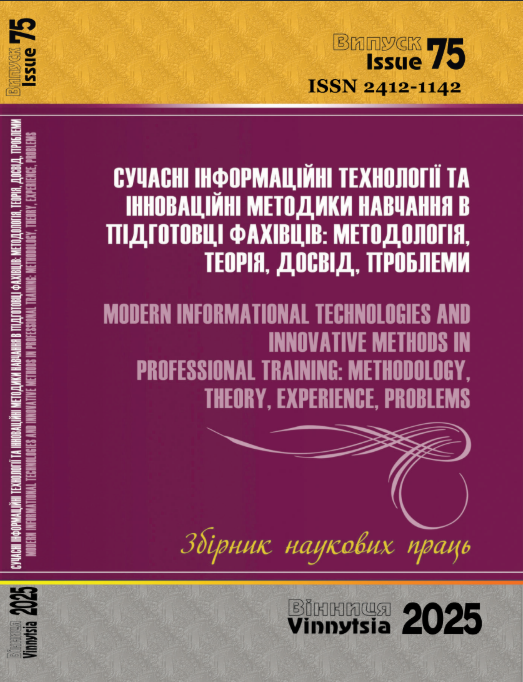MODERN TRENDS IN THE PROFESSIONAL TRAINING OF FUTURE SPECIALISTS IN LIBRARY, INFORMATION, AND ARCHIVAL STUDIES IN HIGHER TECHNICAL EDUCATION INSTITUTIONS
DOI:
https://doi.org/10.31652/2412-1142-2025-75-173-182Słowa kluczowe:
library, information and archival studies, professional training, future specialists, digital education, information management, modern trends in educationAbstrakt
The article provides a comprehensive analysis of current trends in the modernization of professional training of future specialists in library, information and archival science in higher technical education institutions in the context of digital transformation and intensive development of artificial intelligence. It substantiates the need to move beyond traditional teaching approaches and adopt competency-based, interdisciplinary, and technology-integrated educational models. The study examines digitalization as a key driver of educational renewal, emphasizing the active use of specialized software, automated information management systems, and big data analysis methods. The importance of legal aspects in information management ‒ particularly personal data protection, electronic document management, and copyright compliance ‒ is also highlighted. The study also includes the experience of foreign experts-trendsetters in the professional training of future specialists in library and information science and analysis of the recommendations of the International Federation of Library Associations and Institutions (IFLA) on the content of the curricula of future specialists in library and information science to form modern and competitive employees in LIS. Special attention is given to the practical orientation of training, which is implemented through internships, project-based learning, and dual education models that allow students to integrate theoretical knowledge with hands-on professional experience. The author underscores the necessity of aligning national educational programs with European standards to enhance graduates' competitiveness in the international labor market. The study concludes that effective training for information professionals must be dynamic, adaptive, and continuous to keep pace with rapid technological advancements. The author suggests directions for further research, including the integration of artificial intelligence into education, the expansion of digital analytics tools, and the optimization of methods for bridging education with professional practice.
Pobrania
Bibliografia
Kremen V. G. Education and science in Ukraine - innovative aspects. Strategy. Realization. Results. K. Gramota, 2005. 448 p. (in Ukrainian)
Shynkaruk V. Main directions of modernization of the structure of higher education in Ukraine. Official website of the Ministry of Education and Science, Youth and Sports of Ukraine http://www.mon.gov.ua (in Ukrainian)
Sysoieva S. O., Sokolova I. V. Problems of continuous professional education: a thesaurus of scientific research: scientific. Edition of the Academy of Pedagogical Sciences of Ukraine. Institute of Pedagogical Education and Adult Education, MES. Mariupol State Humanitarian University: 2010. 299 p. (in Ukrainian)
Soshynska V. E. Modelling of communication competences of future specialists in information, library and archive field. Library science. Documentation studies. Informology. 2017. № 4. P. 92-96. http://nbuv.gov.ua/UJRN/bdi_2017_4_14 (in Ukrainian)
Mel’nyk S.V. The professional-qualification security of sphere of library science, documentation and information in Ukraine. Library science. Document science. Informology. 2011. № 2. С. 7-11. http://surl.li/fjmtcs (in Ukrainian)
Chandwani A. (2023). Latest Trends in Library and Information Science. IRJHIS. 4(3). DOI Link :: https://doi-ds.org/doilink/03.2023-22213231/IRJHIS2303018 (in English)
Beschler M. (2022). Latest Trends in Library and Information Science. Library Science https://resources.noodle.com/articles/latest-trends-in-library-and-information-science/ (in English)
Suryawanshi S.S.(2023). Current Trends in Library and Information Science. Conference: Contemporary Issues & challenges in Social Science. https://www.researchgate.net/ publication/ 37112595 4_Current_Trends_in_Library_and_Information_Science (in English)
Sprinsyan V.G. Training of document specialists, information analysts is an urgent need of the information society. Modeling of regional economy. 2011. P. 283-289 (in Ukrainian).
Shlenova M. (2024). Hard skills as a key factor in the future professional success of students majoring in “Library, information and archival studies”. Pedagogical Academy: Scientific Notes, (13). https://doi.org/10.5281/zenodo.14573670 (in English)
Shlenova M. (2024). Soft skills as a key factor in the future professional success of students majoring in “information, library, and archival studies. Імідж сучасного педагога, 6(219), С. 44-47. https://doi.org/10.33272/2522-9729-2024-6(219)-44-47 (in English) DOI: https://doi.org/10.33272/2522-9729-2024-6(219)-44-47
The concept of training specialists in the dual form of education (approved by the decision of the Board of the Ministry of Education and Science of Ukraine of 26.01.2018, Protocol No. 1/3-4). https://mon.gov.ua/storage/app/media/kolegiya-ministerstva/02/kontseptsiidualnoi-osviti.doc (in Ukrainian)
Sverdlyk Z. M. Practice-oriented teaching of the academic discipline “informational and analytical activity” as a way of forming professional competence of future specialists in information, library and archival studies. Library science. Documentation studies. Informology. 2017. № 3. P. 18-25 (in Ukrainian)
Chu C. M.; Raju J. et al. (2022). IFLA Guidelines for Professional Library and Information Science (LIS) Education Programmes. IFLA. https://repository.ifla.org/handle/123456789/1987 (in English)






